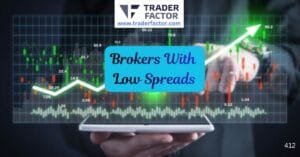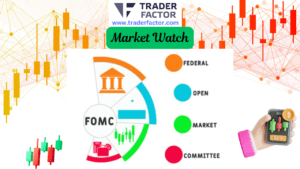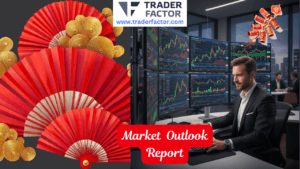
NVIDIA Stock Climbs After Impressive Earnings
Nvidia Stock Climbed after NVIDIA announced record-breaking financial results for its fourth quarter and the full fiscal year 2026. The company reported quarterly revenue of

Nvidia Stock Climbed after NVIDIA announced record-breaking financial results for its fourth quarter and the full fiscal year 2026. The company reported quarterly revenue of

Bitcoin rebounds past $65k as dollar weakens and optimism returns. See why traders are eyeing the $66k resistance level next. Get the full analysis. Bitcoin

Pepeto confirms Binance listing after raising $7.28M in presale. Get the latest Pepeto news, price predictions for 2026-2030, and launch details here. Pepeto Presale Hits

Market Watch: Get this week’s trading outlook, including Trump tariffs, Iran risks, key CPI data, and strategy tips for forex and commodity traders. Quick Market

Discover the top 15 low spread brokers for 2026. Compare ActivTrades, BlackBull, TMGM, and more to slash trading costs and boost profits. Brokers with Low

Get the key points on forex market today, stocks, commodities, and crypto moves. We answer the top questions traders are asking, give you clear technical

London – Gold prices have blasted through the critical $5,000 per ounce barrier and are holding firm, as investors scramble for safety amid a dramatic

Traders, investors, and banks are all waiting for one major event: the release of the FOMC minutes. This report comes from the Federal Reserve. It

Everyone is watching NVIDIA right now. As the undisputed leader in AI chips, its stock moves the entire market. Traders want to know if the

Global financial markets began the week on a subdued note due to widespread regional holidays, setting a steady tone for the opening trading sessions. Limited

Forex traders consistently seek ways to optimize their strategies and reduce trading costs. Understanding the impact of spreads is fundamental to this process. The spread,

The United States economy has reached a significant milestone in its ongoing battle against rising prices, as recent data indicates a notable cooling in inflationary

The U.S. stocks delivered a choppy and ultimately mixed performance on Wednesday, as market participants navigated through a fresh set of economic surprises and ongoing

Financial markets around the globe are pausing in anticipation of the upcoming United States NFP report. This critical economic release is scheduled for Friday and

The market has been a rollercoaster, and some of the brightest stars in the AI software stocks sector have seen their valuations take a hit.
Are you looking for the best way to track trading news and events?
This guide answers the most common search questions about the economic calendar for forex, indices, gold, and crypto.
You’ll find real examples, quick tips, and direct advice, whether you use the Economic Calendar Forex Factory, Economic Events Today, Economic Calendar Today, or Economic Calendar by TradingView.
An economic calendar is a tool that lists dates and times for important financial events. These could be government reports, central bank meetings, or big economic data releases.
It helps traders spot when markets like EUR/USD, AUD/USD, GBP/USD, NZD/USD, NAS100, SP500, US30, XAU/USD, Gold, and BTC/USD could move.
Event | What It Is | Why It Matters | Example (Real Moves) |
Non-Farm Payrolls (NFP) | US jobs report | Rapidly moves EUR/USD, GBP/USD, NAS100, SP500, Gold, BTC/USD | Surprise NFP: EUR/USD might drop, US30 or Gold might spike |
FOMC Meetings & Powell Speeches | US Federal Reserve policy updates; remarks from chair | Critical for USD crosses, indices, gold—sets interest rate and risk tone | Unexpected hawkish tone from Powell can send EUR/USD down, Gold and SP500 diving |
Consumer Price Index (CPI) | US inflation | Shifts rates, hits Gold, SP500, US30, BTC/USD | High CPI: Gold, BTC/USD rise; SP500 falls |
Geopolitical Events (e.g., Trump Speech, Tariffs) | Political statements or tariff changes | Can cause sudden risk-on/risk-off flows in USD, indices, gold, BTC | Trump speech on tariffs triggers big moves in EUR/USD, Gold, and US30 |
Central Bank Rate Decisions | Fed/ECB/BOE rate change | Sets new trends in USD, EUR, GBP, Gold, indices, crypto | Fed hike: USD up, Gold down, indices fall |
Other: GDP, PMI, Retail Sales | Economic growth & demand | Affect forex, indices, commodities, crypto | Strong GDP: SP500, US30 rise; currencies strengthen |
Other data to check: GDP, PMI, Retail Sales―all can affect currency pairs, indices, and crypto.
Wondering how to act on calendar events?
A tool that lists upcoming financial events and data releases that can move markets like EUR/USD, NAS100, or Gold.
It helps spot when volatility will hit pairs like GBP/USD or AUD/USD so you can plan trades or avoid risk.
Look for High, Medium, or Low labels high-impact events often move pairs like EUR/USD, indices like SP500, or gold prices.
Compare the expected number to the real result. Big surprises can cause sharp moves in US30 or BTC/USD.
Right after major news releases like Non-Farm Payrolls or CPI for the US dollar.
Yes—major events move forex (EUR/USD, GBP/USD, AUD/USD, NZD/USD), indices (SP500, NAS100, US30), gold (XAU/USD), and crypto (BTC/USD).
Set it to your local time zone so you don’t miss key events hitting SP500 or NAS100.
Are economic calendars like Forex Factory or Econoday reliable?
They provide solid data but always double-check times and verify with your broker.
US inflation (CPI), Fed announcements, and geopolitical news often trigger big gold price swings.
Macro data (like inflation) and global financial shocks can cause fast moves in crypto.
Yes, especially if you day trade forex, gold, indices, or crypto.
Absolutely just watch for high-impact events and note how GBP/USD or AUD/USD reacts.
The average forecast by analysts markets often price this in, not the previous number.
Many traders exit before key events on EUR/USD or SP500 to avoid sudden losses.
Popular options: Economic Calendar Forex Factory, TradingView, Econoday, or your broker’s built-in tool.
Yes, most modern calendars let you set alerts for EUR/USD, NAS100, Gold, and others.
US earnings, inflation data, and central bank announcements.
Only if key events or emergency meetings are scheduled. Markets are quieter but some crypto events may occur.
Use filters like “Economic Calendar Today” for just today’s scheduled events.
By planning entry and exit around volatility buying breakouts or fading spikes on pairs like EUR/USD, Gold, SP500, or BTC/USD.
Start planning every trade smarter with an economic calendar built for today’s forex, index, gold, and crypto traders.